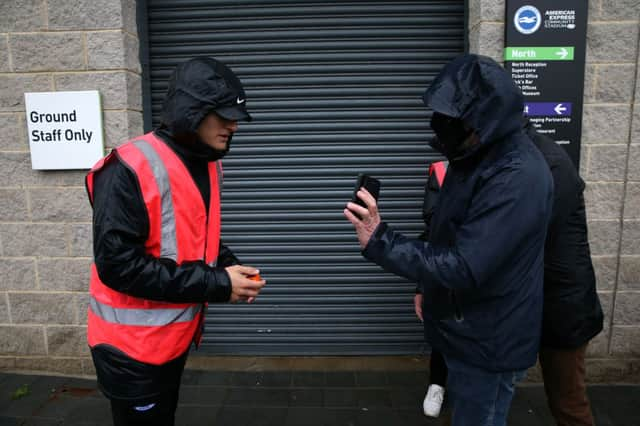People face £10k fine for faking Covid vaccine status or negative test


People who fake their Covid-19 vaccine status or negative test results face being fined £10,000 under new laws in England.
The laws on Covid passes are due to be voted on by MPs on Tuesday (14 December) and will require people to show proof of two vaccine doses, or a recent negative lateral flow test, to gain entry to nightclubs or large events.
Advertisement
Hide AdAdvertisement
Hide AdIf approved, a ‘Covid pass’ will be required as a condition of entry to all venues which are open between 1am and 5am, have a dancefloor, play music for dancing, and serve alcohol in the early hours of the morning.
This includes nightclubs, dance halls, discos, some live music venues, theatres, concert halls or other public buildings, exhibition and conference centres and sports stadiums.
It also applies to indoor crowded venues with a capacity of more than 500, outdoor events of 4,000 or more, and any event with a capacity of 10,000 people.
The new policy is expected to pass as Labour leader Keir Starmer has indicated his party will back them, and will come into effect from Wednesday (15 December).
Advertisement
Hide AdAdvertisement
Hide AdPeople must show an NHS Covid pass (on the NHS app) or an approved equivalent certificate to prove they have been vaccinated, or show a “valid notification” of a negative test result taken within 48 hours prior to the event, unless they are exempt.
However, it is feared that people could fake texts or emails from the NHS testing service confirming a negative result.
As such, new legislation will make it an offence to make, adapt, supply or offer to supply “false evidence of Covid status to another person” which is known to be “false or misleading”.
People will be issued a fixed penalty notice for breaching the rules at a cost of £10,000 for a first offence.
Venues also to be fined for rule breaches
Advertisement
Hide AdAdvertisement
Hide AdNew Covid laws could also see businesses shut down by councils if they fail to comply with the rules, or if they are not carrying out suitable checks on customers attending events.
Venues are “required to check every person admitted to the event or venue”, unless they get approval from councils in advance to carry out spot checks instead if clearing everyone for entry would not be possible, would lead to crowds gathering and present a safety risk or a “potential threat for terrorist action”.
Exceptions include weddings, funerals, memorials and other “significant life events”, such as celebrating someone’s birth, “coming of age” or ceremonies to mark religious membership, as well as events taking place in private houses, pubs, cafes, restaurants, bars and social or members’ clubs, unless the event is ticketed and there is a charge for entry.
Any businesses in breach of the rules on carrying out checks, or ignoring improvement or closure notices issued by councils, could be fined £1,000 in the first instance, reduced to £500 if paid within 14 days.
Advertisement
Hide AdAdvertisement
Hide AdThe fine increases to £2,000 and £4,000 for second and third offences, and can jump to £10,000 for fourth or any subsequent offences.
The regulations, which expire on 26 January 2022, impose “obligations on those responsible for organising certain events, or managing certain venues to take reasonable measures to ensure that they do not admit any person to such events, or venues unless the person concerned has been fully vaccinated or has tested negative for coronavirus within the last 48 hours, is participating (or has participated) in a clinical trial of a coronavirus vaccine or, for clinical reasons, should not be vaccinated with a coronavirus vaccine.”
Businesses must also keep records on the checks they have carried out for at least three months after events, under a section of the law lasting until 26 April 2022.
Human rights barristers Adam Wagner, who examines coronavirus regulations and interprets them on Twitter for the public, said the laws were “so complex” and it was “absolutely absurd” they were published less than 24 hours before Parliament is due to consider and vote on them.